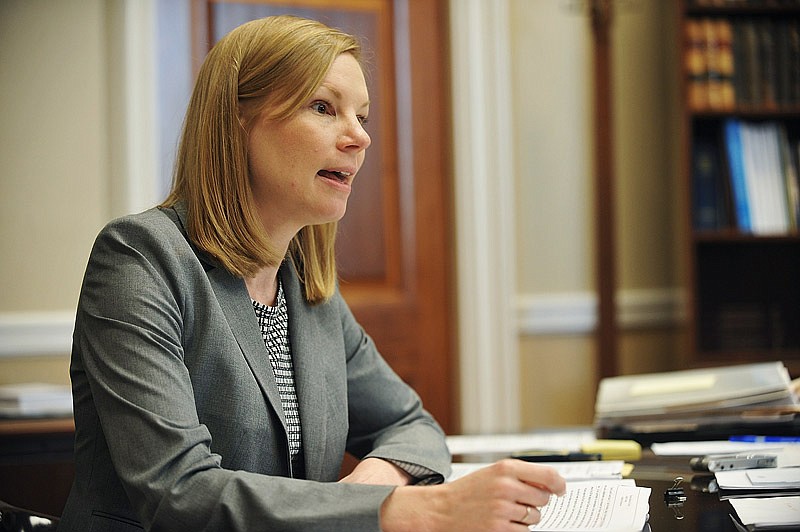Missouri State Auditor Nicole Galloway called on the Missouri General Assembly to simplify the process of distributing local funds to domestic violence shelters Monday.
Galloway said more than 28,000 domestic violence shelter requests were turned down in 2017, a rate five times higher than in surrounding states. To allow Missouri's 77 domestic violence shelters to better help the state's residents, Galloway suggested streamlining the process by which counties and cities collect fees used to partially fund shelters and to remove red tape that burdens shelters seeking funding.
Missouri's 77 domestic violence shelters receive funding from state fees, state and federal grant programs, state tax credit programs, and contributions. State law requires that a $5 fee be added to the cost of a marriage license to provide assistance to domestic violence shelters. Counties and cities may implement a surcharge of $4 for each criminal case filed, a separate $5 marriage license fee and a $2 surcharge on any civil case filed in circuit court to provide financial assistance to domestic violence shelters, according to a report issued Monday by Galloway's office.
Galloway's office said shelters forgo $698,000 in revenue each year because counties and cities elect not to collect all optional domestic violence fees allowed by state law. Additionally, Galloway's office said, 18 counties, including Miller County, collected at least the mandatory $5 marriage license fee for domestic violence shelters but did not distribute the funds in 2017.
"These counties are holding on to it because they're not really sure how to comply with the law," Galloway said during a news conference. "It's not as if they're holding onto this money and using it for potholes."
Last year 45,253 incidents of domestic violence occurred statewide, according to Galloway's report. Currently only 77 domestic violence shelters exist statewide, or about two for every three counties. Just two shelters - Rape and Abuse Crisis Service in Jefferson City and Citizens Against Domestic Violence in Camdenton - serve Cole, Callaway, Camden Miller, Moniteau, and Osage counties.
As of Dec. 31, 2017, court fees in Miller County's domestic violence shelter fund built a balance of $68,802 over the past 11 years, according to Galloway's report.
Miller County Clerk Clinton Jenkins said that for years nobody in Miller County understood the law. This year Jenkins' office contacted CADV and donated $25,000-$30,000 to the shelter in Camdenton, he said. His office plans to make a similar donation to RACS in Jefferson City.
"No one ever requested it," Jenkins said. "There's a way it's supposed to be handled; and since I've been here, nobody had ever gone through the loopholes to request the money."
Galloway recommended state law be changed to require local governments to make disbursements once per year.
Jenkins said that because of complicated existing laws surrounding disbursements, the process is not that simple.
"Two years ago, nobody (in Miller County) knew how to disburse the money," Jenkins said. "They have to request it by Oct. 1, basically, so we can give them the money (next year)."
Among the requirements to receive local funds, shelters must submit paperwork showing they are incorporated as a nonprofit organization, receive at least 25 percent of their funds from sources other than funds from localities, and file an annual report with the state. Shelters that serve several counties, like RACS and CADV, must submit that paperwork to every local government they serve, Galloway said.
Galloway recommended a state agency designate which shelters can receive local funding.
"A shelter already has to submit that same eligibility and statistical information to the (Missouri) Department of Social Services and the agencies administering state and federal grants," Galloway said. "There would not be a need for shelters to file redundant paperwork at the local level."
The report cited Arkansas, Kentucky and Tennessee as states that collect local fees for domestic violence shelters then distribute that money based on need. Creating a similar system would allow money to be distributed more evenly and effectively than Missouri's current system, Galloway said.
Last year 6,303 women, 5,048 children and 83 men received shelter in domestic violence shelters, according to Galloway's office. Though shelters provided 323,102 bed nights last year, shelters turned away 28,182 requests, according to the report.
Even if all counties charge all optional fees, Galloway said, there likely would not be enough money to serve every resident turned away at shelters.
With the existing law and local fee structure, Galloway said, the state should focus on creating a more efficient system that can serve more residents. She hopes the General Assembly will pass a bill next year to create a centralized system for distributing local fees.

